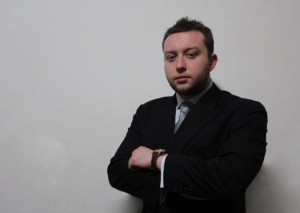Op-ed: Homeland is a sacred word, army is not. A look into some Georgian patriotism idiosyncrasies
Photo by blogger Blumgardt
It has always struck me as rather odd that most Georgian men consider themselves to be warriors but regard military service as demeaning, pointless and fit only for those incapable of doing anything else. Indeed, many Georgians of my acquaintance have gone to great lengths to avoid service, either in the form of repeating the last year of university multiple times and so exempting themselves as students, or by persuading (and in years previous, by bribing) a doctor to declare them medically unfit.
Anyone attending a traditional Georgian supra feast will hear many toasts given to Georgia, the homeland, the motherland; a country that has suffered so much at the hands of foreign invaders but has still managed to preserve its culture and identity thanks, to the tenacity of Georgian warriors who, defeated but not beaten, remained strong in the face of the Persians, the Turks and the Russians. The medieval Georgian soldiers who beat the overwhelming force of the Seljuk Turks at Didgori were imbued with the same spirit of their descendants who mounted a desperate defence to hold the line against the Soviet horde in the 1920s.
Those men, those shadowy heroic figures from the past, deserve all the praise that is heaped upon them by modern Georgians, but one is inclined to wonder what changed in the national character. Surely a medieval Georgian knight at Didgori facing impossible odds but determined to win, or a young militiaman facing certain death as the Soviets swept down from Russia, would not have thought very much of the more recent military demands facing Georgian men, of part-time service for one year.
Indeed, were they given the chance, they might even remind their patriot toast-giving descendants that with the ever-present threat of the Russian forces still lying to the north, they can damn well put their money where their mouth is and wear a uniform for a year; standing guard outside a government building one day in three, while surely tiresome, does not compare much with facing the inexorable tide of medieval Islamic armies or the Red Menace.
My point is that I have never been anywhere where people are as patriotic as Georgians and yet still unwilling to do much for their country; the toasts to Georgia the nation ring somewhat hollow when the toast-giver then shrugs off the idea of military service with a sneer. The idea of the Georgian warrior is – for the most part – more of an aspiration than a description.
Conscription has been a part of the Georgian existence for almost one hundred years, and one can understand the reluctance of anyone to serve against their will; the harsh realities of military life are best adapted to by willing volunteers, and military historians have filled books with statistics showing how the quality of armies declines when their ranks are swelled by conscripts.
I have spoken with several men called for service during the brief 2008 war against Russia; one of whom (a military enthusiast) related how he was handed a rifle, but no ammunition, and another claimed that he, his brother and some other friends ordered for duty fled to Armenia. In conversation with others who were not called up to fight, there was still no enthusiasm to defend the country.
I can understand the reluctance to face a Russian tank entirely; my own time in uniform was unpleasant enough that I can also understand how Georgian men might not want to serve in the military in the first place. I do find it difficult, though, to equate the (almost fanatical) love and pride for Georgia with the total lack of interest in defending it. The former is far more common amongst fist-pumping patriots who can’t wait to sign up, while the latter is the territory of liberals who believe anyone in any kind of uniform is a ‘fascist’.
Georgia’s current Minister of Defence, Levan Izoria, seems to prescribe himself to the belief that all Georgian men are born warriors, since he has undone the good work of his predecessor, Tinatin Khidasheli, in restoring conscription to the Georgian Armed Forces. This decision was met with dread by a Regular Army friend of mine, since Georgia’s professional soldiers have proven themselves on operations in Afghanistan over a number of years; reintroducing military conscription is something of a step back for the GAF’s aspiration to become a NATO-style army.
Izoria has claimed that the new incarnation of Georgia’s conscription programme will differ from the dismal version that preceded it, since it will be run by staff of the Regular Army and will allegedly prepare conscripts for real combat situations. Since the new course is only scheduled to last three months, anyone with military experience will be aware that ninety days is hardly long enough to equip men with the training and experience necessary to cope with the dangers posed by modern warfare.
Yet in truth the Minister of Defence is ignoring the base truth that forcing young men into uniform has hardly been effective in the past, and that making the training harder and more intense with the prospect of real duty to follow in the event of a national emergency, is hardly going to turn the patriotic shouting of supras into the willingness to get up at dawn, running for miles in the rain and lying in the mud with a heavy pack and rifle.
Perhaps the Minister should consider how to make the Regular Army a more attractive career (with the money saved from a pointless conscription programme) instead of wasting government funds on an idealized attempt to resurrect the warrior spirit of the past with the apathetic men of Georgia’s present.

Tim Ogden is a British journalist currently based in Tbilisi



















